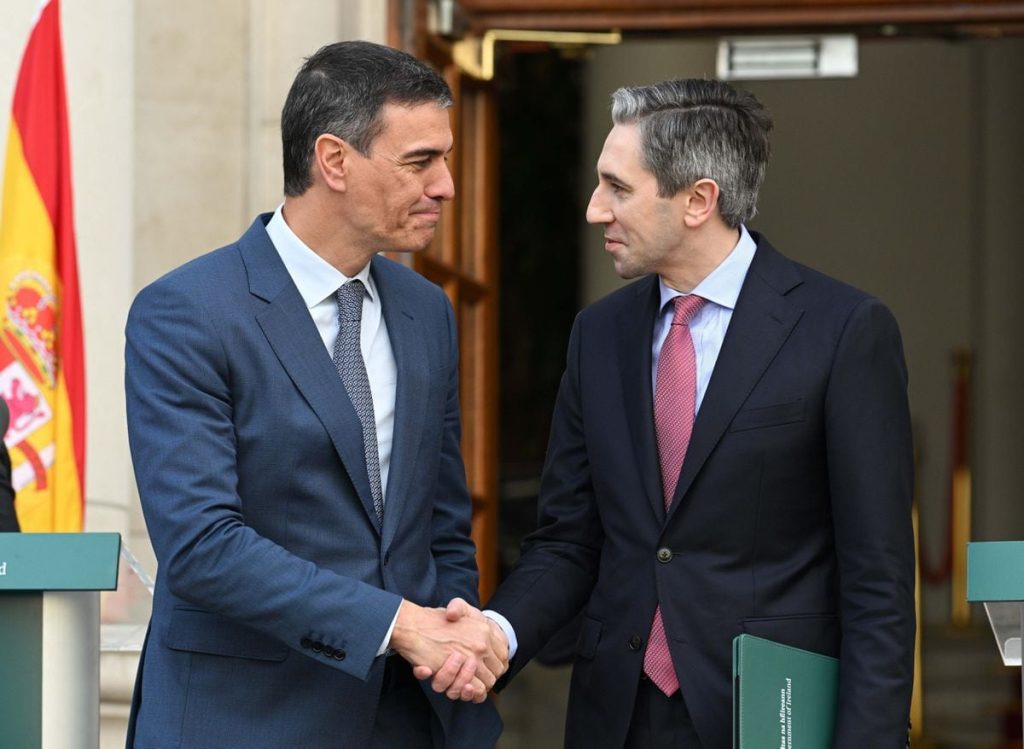Around twenty people, carrying Spanish and Palestinian flags, cheered Pedro Sánchez on Friday as he arrived at the Government headquarters in Oslo. This was an unusual and anecdotal event in Spain, where the president does not usually encounter demonstrations of support, but rather the opposite. The Norwegian Prime Minister, Jonas Gahr Støre, thanked him for his clear support for the recognition of the Palestinian State and his efforts to gather support across Europe. The Norwegian Parliament urged Støre last November to recognize Palestine as a State, and on Friday he declared himself “ready” to do so. While he did not commit to taking this step at the same time as Spain, he did not rule it out. A senior official at La Moncloa reflects, “When all this is over, history will harshly judge those who did not do what was in their power to prevent it.” An expert agrees that the ongoing tragedy in Gaza is generating deep discomfort among European societies and a sense of helplessness. The recognition of the Palestinian State, beyond its practical effectiveness, is a way for many governments, especially from medium and small countries, to satisfy public opinion. Many want to do something, but do not want to act alone to avoid standing out. Sánchez has seen an opportunity and has decided to take the lead. So far, he has become the coordinator of countries willing to recognize Palestine as a State, evaluating when and how to take that step.
After his stop in Oslo, the Spanish president landed in Dublin (Ireland), where the new Taoiseach (Prime Minister), Simon Harris, confirmed his commitment to his predecessor’s declaration signed on March 22 with Spain, Slovenia, and Malta, in which they expressed their willingness to recognize the Palestinian State at the right time. “It seems we are getting closer [to that moment] and we want to move forward hand in hand with Spain, with as many allies as possible,” he added. In the middle of the campaign for the Basque regional elections and less than a month before the Catalan elections and two months before the European elections, Sánchez is dedicating a significant part of his efforts to gather a critical mass of countries to make the recognition of Palestine a relevant issue and not an isolated gesture, as happened to Sweden in 2014. On Monday, he will meet the new Portuguese Prime Minister, Luis Montenegro, who has already expressed that he “views favorably” Palestine’s accession to the UN; on Tuesday he will travel to Slovenia to finalize their commitment from March 22; and on Wednesday, on the sidelines of the European Council, he will meet with his counterparts from Luxembourg and Belgium, which currently holds the EU presidency. Although Sánchez is involved in international politics during an electoral cycle, he remains focused on the upcoming elections. In La Moncloa, they emphasize that while the Spanish president leads the Socialist International, the governments supporting the recognition of the Palestinian State belong to different political families – Christian Democrats (Ireland), Social Democrats (Norway), or Liberals (Slovenia). This issue has majority support in Spain, including from the conservative Popular Party (PP) voters.
Israel has remained silent in response to Sánchez’s activism after recalling its ambassador to Madrid last November. The US Department of State has stressed that the recognition of the Palestinian State should result from an agreement with Israel, but also recognizes that it is a sovereign decision for states to decide when and how to recognize another. According to diplomatic sources, Washington has informed Madrid that it will not boycott Spain’s initiative; in other words, it will not pressure countries that join to refrain from doing so. The fact that Sánchez is focusing on international politics during an electoral cycle does not mean that he is ignoring domestic politics. On the contrary, La Moncloa highlights that although the Spanish president presides over the Socialist International, the governments supporting the recognition of the Palestinian State belong to different political families – Christian Democrats (Ireland), Social Democrats (Norway), or Liberals (Slovenia). This issue has majority support in Spain, including from the conservative Popular Party (PP) voters.
The diplomatic battle is unfolding on various fronts. On the 18th, the Security Council will discuss Palestine’s full membership in the UN, and although the request is still pending in the admissions committee, Algeria has announced that it will put forward its own proposal for a vote. If the US, as expected, vetoes it, Arab countries will take the matter to the General Assembly, experts warn, and in that forum, all European countries, those that have joined Spain, and those that have not, will have to publicly declare their positions. Unless a retaliatory attack by Iran against Israel sets off a chain reaction and the war enters a new phase.


